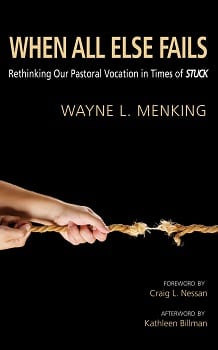What pastoral caregiver or leader has not found themselves in a place where they have tried all they know to try and nothing seems to be working. Wayne Menking calls this “the place of stuck.” Building on the thinking of Bowen Family Systems Theory, as introduced to clergy through Rabbi Ed Friedman, he offers a way forward during such stuck times.
The first chapter, “Our Vocation Challenged – Rethinking What We Are About,” launches that quest immediately. Menking clarifies the condition of “stuck” and reflects on ways in which pastoral care often leads to such a condition. We can sabotage the very change we would like to see occur. Menking encourages us to learn to think of pastoral care in a way that moves it from palliative comfort to a merging of care and leadership. He understands pastoral care as leading people from what is old into what is new, relying on the biblical narratives of the Exodus and Wilderness to illustrate his thinking. Menking also offers stories drawn from his work in Clinical Pastoral Education. This chapter, like the other three, closes with provocative questions to help the reader probe the meaning and application of Menking’s ideas.
Chapter two bears the puzzling title “God Cares Deeply – But You Won’t Find Much Sympathy.” Here Menking compares the theological expression of God’s love and compassion as revealed in Scripture with the more narcissistic view of the “commodified God” worshipped by our culture – the sympathetic God who “feels sorry for us.” The biblical narrative offers a vision of God who cares, who acts, who liberates, who moves the sufferer from the old to the new. Menking explores five biblical texts in which God in power calls for new life: Matthew 5:1-12, Matthew 5:38-42, John 3:16, Mark 16, and 1 Kings 19:1-18. Pastoral care is about leading others to live in this new reality.
The third chapter, “Called to Care – But It Might Not Be What You Thought,” takes up the disillusionment occurring when the expectations about ministry crashes into the real experience of ministry. Our efforts to be “good pastors” run headlong into the realities of the congregation and its life, its needs, its complaints, its stuckness. Menking addresses three myths Friedman named in his book Failure of Nerve: the myth of data (getting it right), the myth of empathy (keeping everyone happy and together), and the myth of self (false humility). He argues that the more we pursue these myths, the more we are likely to get stuck. He then calls for a rethinking of “good pastor” in light of Luther’s theologia crucis.
The final chapter, “From Niceness to Power – Rising to the Occasion,” calls for a practice of pastoral care and leadership that leans into the power of God. Menking offers four case studies to illustrate the move from niceness to power in care, which allowed both the caregiver and the person for whom they were caring to move out of the position of stuck.
Readers familiar with family systems theory will find Menking’s words ringing true. He calls for pastoral caregivers and leaders to operate out of an authentic differentiation of self. But he also calls for them to function out of a deep confidence in God’s power to take people to a new place in their lives. Those unfamiliar with systems thinking will find here a useful introduction and may find themselves looking for works by Murray Bowen, Ed Friedman, Roberta Gilbert, Michael Kerr, Peter Steinke, or Ronald Richardson.
Recommended by Dr. R. Robert Creech, Professor of Christian Ministries and Director of Pastoral Ministries at Truett Seminary
